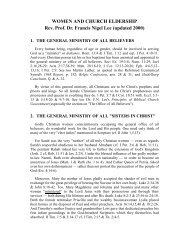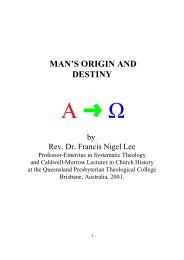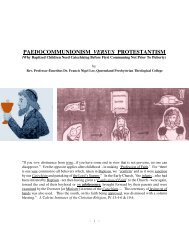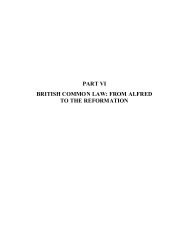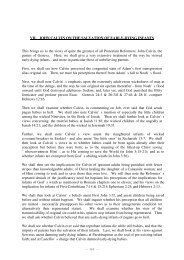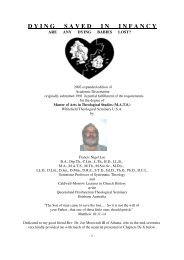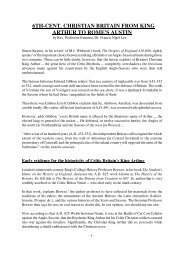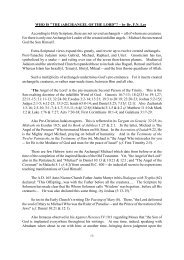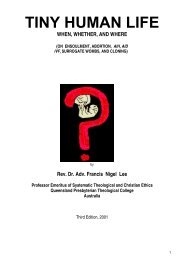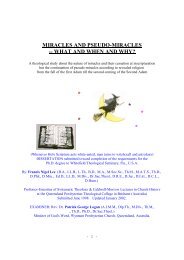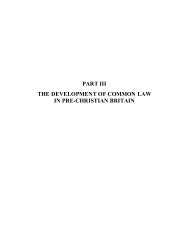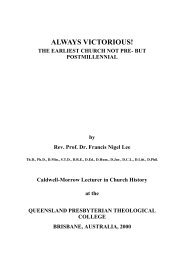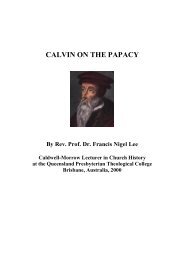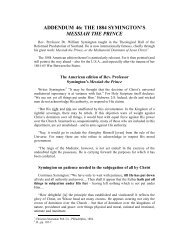THE CHRISTIAN AFRIKANERS - The Works of F. N. Lee
THE CHRISTIAN AFRIKANERS - The Works of F. N. Lee
THE CHRISTIAN AFRIKANERS - The Works of F. N. Lee
You also want an ePaper? Increase the reach of your titles
YUMPU automatically turns print PDFs into web optimized ePapers that Google loves.
eturn. Nothing wrong with that. But then the State decided to sweeten the pot. It decreed that eachweek, a number would be drawn from a hat -- and the "lucky" person whose number was drawn,would be given a prize <strong>of</strong> one or two thousand dollars.<strong>The</strong> Church was furious! This led to a major Church-State confrontation in South Africa. Though itlost that battle, the Church warned the State that its action was going to bring the curse <strong>of</strong> AlmightyGod onto the nation -- by introducing this gambling element into the matter.<strong>The</strong> State told the church it respected her view-point and right to say this. Yet the State felt itneeded to do this in order to raise the money needed so as to be able effectively to fightcommunism.So you do get these Church-State clashes on these matters from time to time. Can you imaginesomething like that, a Church-State clash on such an issue, taking place in any other country <strong>of</strong> theworld today? But it is that way in South Africa.Of course, there have been occasions when the State is right and the Church is wrong! We havealready referred to the State's decision to have the Romish cross removed from Devil's Peak. I canalso recall an occasion when the State rightly prohibited a Church from immersing totally nakedwomen in public -- and another occasion when the State prosecuted a blasphemy case in the teeth<strong>of</strong> opposition from some <strong>of</strong> the denominations.<strong>The</strong>re is also a massive missionary outreach <strong>of</strong> the South African Reformed Churches -- intoRhodesia, into Nigeria, and into various other parts <strong>of</strong> Africa. <strong>The</strong>re are also denominationalmissions to Jews and Moslems. <strong>The</strong>re are even missions to the Portuguese and the Czechs, to Japan,to European embassies throughout Europe, and soon also in North America. <strong>The</strong>re is even adenominational mission to the Communists. It evangelises Russian and Polish seamen that call inand around Cape Town, and "bombards" them with Bibles.<strong>The</strong>re is a tremendous emphasis on Reformation Sunday in the South African Reformed Church.<strong>The</strong> pulpit is always in the middle <strong>of</strong> the church -- with a massive Bible on it, and a communiontable in front <strong>of</strong> it (at a much lower level). <strong>The</strong> liturgy is simple, and strictly Genevan. <strong>The</strong> Eldersempower the Preacher to proclaim God's Word. <strong>The</strong> announcements are made at the beginning <strong>of</strong>the service, so that they will not interrupt the service once it gets underway.<strong>The</strong> first thing that is sung is generally a Psalm -- not a Hymn. <strong>The</strong> Hymns may be sung later. <strong>The</strong>Ten Commandments are read every Sunday from the pulpit. <strong>The</strong>reafter, the people sing a Hymn tothis effect: "O Lord, we have broken Thy Law! Grace is all that we appeal to. But work in our heartthrough Jesus Christ -- a new desire to keep Thy Law!"<strong>The</strong> Apostles' Creed is then pr<strong>of</strong>essed by the people. <strong>The</strong>y then give their affirmation to that Creed.<strong>The</strong>n the Preacher, in the Name <strong>of</strong> Jesus Christ, pardons and absolves all those who have made thisConfession <strong>of</strong> their faith -- according to the true condition <strong>of</strong> their hearts before God.Only organs are used in public worship. Pianos, violins, guitars and such like are regarded asinstruments not generally worthy enough to accompany the singing <strong>of</strong> the praises <strong>of</strong> the Almighty.<strong>The</strong> music in the church consists <strong>of</strong> all 150 Psalms, together with a few extra melodies <strong>of</strong> some <strong>of</strong>them -- and also 180 really excellent Hymns (all <strong>of</strong> them indexed chronologically in the order <strong>of</strong>the Apostles' Creed). Very recently, they strode back over the 17th century Dutch and Germanmelodies, and went all the way back to the original Genevan melodies <strong>of</strong> the French ReformedChurches at the time <strong>of</strong> the Protestant Reformation).



